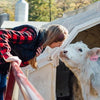
#FarmLove – Stuart Farm
“You never know where life will lead you,” chuckles Lorraine Stuart Merrill, a working dairy farmer in Stratham, New Hampshire who is also closing in on a decade as the state’s Commissioner of Agriculture. “There was no grand career plan here. It was a lot of serendipity,” she admits.

For starters, Lorraine did not plan to be a farmer. “I spent my childhood on our farm, always outside, exploring. I loved the farm, loving raising and showing my Brown Swiss cows,” she recounts. “But I didn’t want to be a farmer or marry a farmer because they worked so hard. I did always imagine raising my own kids on a farm, though.”

She went away to college, “a whole eight miles down the road,” to the University of New Hampshire, where she met her future husband, John Merrill. They connected over a shared love of nature. “John grew up hiking in the White Mountains, working on trail crews in the summer. One of his grandfathers had a small farm in Maine—although he did not make his living from it—and John had always loved it,” Lorraine recalls. Stuart Farm was so close that John worked on the farm part-time while in school. “He just got sucked in,” Lorraine recalls. “He turned into a farmer and then I turned into a farmer, too.”

Over the decades—on land originally purchased by Lorraine’s parents, aunt and uncle in 1961 with another farm since added—the family has continued to run their dairy business guided by principles of conservation and stewardship. Along the way, Lorraine and John raised two sons on the farm and one of their sons, Nathan, and his wife, Judy, joined them in partnership on the farm. Lorraine also developed a successful freelance journalism career specializing in agriculture, environment and planning. “At first I resisted writing about farming even though my mentors kept pushing it,” she explains, but gradually Lorraine realized it made sense to focus on topics she was passionate about. As a bonus, she adds, “It was a great way to get new ideas about issues we were facing on our farm, to pick the brains of leading farms and experts.”

Another unanticipated twist, Lorraine admits, was her job as Commissioner. “As a farmer and as an agriculture journalist, I paid a lot of attention to policy issues,” she says. She had also been appointed to various state-wide roles for the Farm Service Agency and the New Hampshire university system, as well as USDA’s Sustainable Agriculture Research and Education program. When it looked like the Commissioner position would open up, friends and colleagues kept mentioning that she would be a strong candidate for the position. Lorraine demurred at first but then, she reflects, “I got to thinking it could be a pretty unique opportunity to make an impact.”

In her roles as farmer, community member and as Commissioner, Lorraine believes that sustainability is a critical goal: “working to ensure that resources are there for future generations and that we hopefully leave things better than we find them.” Sustainability, she clarifies, “is not just about the environment, but about community well-being and about economic sustainability. It’s a three-legged stool. If you pull off any one of them, the rest collapses. We need all three working together.”

Nestled at the edge of the Great Bay Estuary, Stuart Farm was one of the first farms to be conserved in New Hampshire. “My parents and aunt sold the development rights on this farm back in the early 80s,’ Lorraine says. “They wanted to ensure the farm would remain undeveloped; it also made it possible over time for us as the younger generations to buy the farm and keep it in the family.” In 2003, the Merrills were named Stewards of the Lands by the American Farmland Trust, the organization’s highest honor.

For her own family and many New England farming families, Lorraine reflects, a conservation ethic has always been top-of-mind. “My late uncle Robert was passionate about protecting the soil and water,” she notes, explaining that the farm’s location on a tidal river heightens awareness of the delicate estuarine ecosystem. Conserving farmland so it can remain open, constructing protective wetlands and employing cropping practices that prevent erosion and run-off are the right thing to do for many reasons.

“We’re birders, hikers, tree-huggers,” Lorraine says with a smile. “The salt marshes on our farm attract some amazing birds. Two years ago, in May, we had the only recorded sighting of a Black-necked Stilt in New Hampshire. I was finishing up chores one morning before work and looked out over the retention pond to see this distinctive bird with hot pink legs and black and white markings. All the bird-watchers rushed out to see it.”

“I really believe that advancing the interests of agriculture and farming benefits all people in the state, not just farmers,” Lorraine continues. “Local farms, local agriculture and local food are really important to healthy local communities.” Especially in New Hampshire, she points out, agricultural conservation programs have played a critical role in preserving open land for those who want to farm— and also for the occasional Black-necked Stilt looking for a resting spot on its long migratory journey.
Summer is a great time to take advantage of your local Audubon Society. Check out what’s on offer at the Audubon Society near you.
They also have an awesome set of birdcams where you can watch real-time action in osprey nests in Maine and Connecticut to hummingbirds at a feeder in Arizona!













